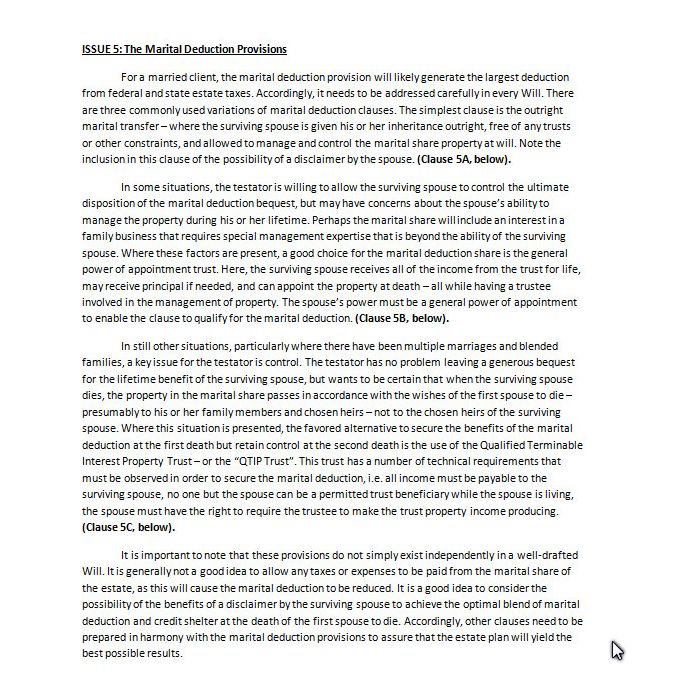Marital Deduction Provisions Will Clauses - 3 Clauses (6 Pages)
For a married client, the marital deduction provision will likely generate the largest deduction from federal and state estate taxes. Accordingly, it needs to be addressed carefully in every Will. There are three commonly used variations of marital deduction clauses.
3 Clauses Are Included To Address The Following Issues:
CLAUSE 1: Marital Share Outright to Surviving Spouse
CLAUSE 2: Marital Share Using General Power of Appointment Trust
CLAUSE 3: Marital Share Using Qualified Terminable Interest Property Trust (QTIP Trust)
Marital Deduction Provisions Will Clauses - 3 Clauses
- Marital Share Outright to Surviving Spouse
- Marital Share Using General Power of Appointment Trust
- Marital Share Using Qualified Terminable Interest Property Trust (QTIP Trust)
For a married client, the marital deduction provision will likely generate the largest deduction from federal and state estate taxes. Accordingly, it needs to be addressed carefully in every Will. There are three commonly used variations of marital deduction clauses. The simplest clause is the outright marital transfer – where the surviving spouse is given his or her inheritance outright, free of any trusts or other constraints, and allowed to manage and control the marital share property at will. Note the inclusion in this clause of the possibility of a disclaimer by the spouse. (Clause 1).
In some situations, the testator is willing to allow the surviving spouse to control the ultimate disposition of the marital deduction bequest, but may have concerns about the spouse’s ability to manage the property during his or her lifetime. Perhaps the marital share will include an interest in a family business that requires special management expertise that is beyond the ability of the surviving spouse. Where these factors are present, a good choice for the marital deduction share is the general power of appointment trust. Here, the surviving spouse receives all of the income from the trust for life, may receive principal if needed, and can appoint the property at death – all while having a trustee involved in the management of property. The spouse’s power must be a general power of appointment to enable the clause to qualify for the marital deduction. (Clause 2).
In still other situations, particularly where there have been multiple marriages and blended families, a key issue for the testator is control. The testator has no problem leaving a generous bequest for the lifetime benefit of the surviving spouse, but wants to be certain that when the surviving spouse dies, the property in the marital share passes in accordance with the wishes of the first spouse to die – presumably to his or her family members and chosen heirs – not to the chosen heirs of the surviving spouse. Where this situation is presented, the favored alternative to secure the benefits of the marital deduction at the first death but retain control at the second death is the use of the Qualified Terminable Interest Property Trust – or the “QTIP Trust”. This trust has a number of technical requirements that must be observed in order to secure the marital deduction, i.e. all income must be payable to the surviving spouse, no one but the spouse can be a permitted trust beneficiary while the spouse is living, the spouse must have the right to require the trustee to make the trust property income producing. (Clause 3).
It is important to note that these provisions do not simply exist independently in a well-drafted Will. It is generally not a good idea to allow any taxes or expenses to be paid from the marital share of the estate, as this will cause the marital deduction to be reduced. It is a good idea to consider the possibility of the benefits of a disclaimer by the surviving spouse to achieve the optimal blend of marital deduction and credit shelter at the death of the first spouse to die. Accordingly, other clauses need to be prepared in harmony with the marital deduction provisions to assure that the estate plan will yield the best possible results.
Author:
Steven G. Siegel is president of The Siegel Group, a Morristown, New Jersey - based national consulting firm specializing in tax consulting, estate planning and advising family business owners and entrepreneurs. Mr. Siegel holds a BS from Georgetown University, a JD from Harvard Law School and an LLM in Taxation from New York University.
He is the author of several books, including: Planning for An Aging Population; Business Entities: Start to Finish; Taxation of Divorce and Separation; Income Taxation of Estates and Trusts, Preparing the Audit-Proof Federal Estate Tax Return, Putting It Together: Planning Estates for $5 million and Less, Family Business Succession Planning, Business Acquisitions: Representing Buyers and Sellers in the Sale of a Business; Dynasty Trusts; Planning with Intentionally-Defective Grantor Trusts; The Federal Gift Tax: A Comprehensive Analysis; Charitable Remainder Trusts, Grantor Trust Planning: QPRTs, GRATs and SCINs, The Estate Planning Course, The Retirement Planning Course, Retirement Distributions: Estate and Tax Planning Strategies; The Estate Administration Course, Tax Strategies for Closely-Held Businesses, and Tort Litigation Settlements: Tax and Financial Issues.
Mr. Siegel has lectured extensively throughout the United States on tax, business and estate planning topics on behalf of numerous organizations, including National Law Foundation, AICPA, CCH, National Tax Institute, National Society of Accountants, and many others. He has served as an adjunct professor of law at Seton Hall and Rutgers University law schools.
The Siegel Group provides consulting services to accountants, attorneys, financial planners and life insurance professionals to assist them with the tax, estate and business planning and compliance issues confronting their clients. Based in Morristown, New Jersey, the Group has provided services throughout the United States. The Siegel Group does not sell any products. It is an entirely fee-based organization.
Contact the Siegel Group through its president, Steven G. Siegel, e-mail: [email protected].

